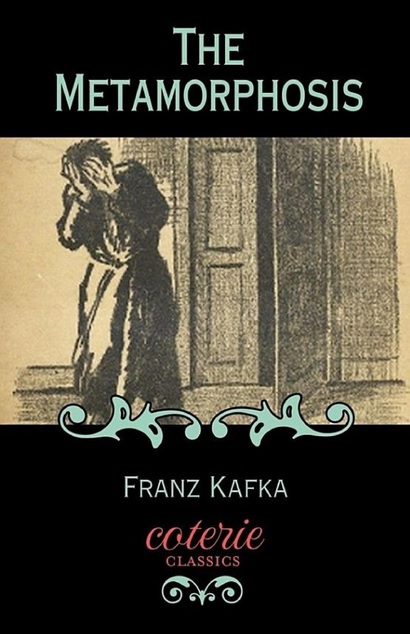Introduction
Franz Kafka’s The Metamorphosis is a rather intriguing tale that has a metaphorical title. Metamorphosis denotes transition or shift. There are several transformations in the plot reflected in the play’s protagonists. The transformations that are apparent in the book become recognizable to readers of the novel. This article would dive into the study of the major characters in the story, emphasizing those that have endured improvements to explain the title The Metamorphosis.
Book Review: The Metamorphosis by Franz Kafka
Introduction
Franz Kafka's The Metamorphosis is a rather intriguing tale that has a metaphorical title. Metamorphosis denotes transition or shift. There are several transformations in the plot reflected in the play's protagonists. The transformations that are apparent in the book become recognisable to readers of the novel. This article would dive into the study of the major characters in the storey, emphasising those that have endured improvements to explain the title The Metamorphosis.
Plot Overview
George Samsa, a travelling sales representative, wakes up in his bed to find himself transformed into a large cockroach. He wants to get out of bed, only to remember that, because of his convex back, he can not. Gregor focuses about how dreary life as a salesman is when still in bed and how soon he might leave if his parents and sisters didn't depend on him for their maintenance. Gregor, who dislikes his career, has to work after his father's company went bankrupt owing to financial difficulties to support his relatives. He notices as he looks to the clock that he has overslept and skipped the train to work. He dismisses heading to work soon, and then he proceeds to slumber. His mother taps on the door of his bedroom and requests him to unlock the door. Gregor discovers, after answering his mother, that his voice has also shifted (Smith 189). His family assumes that Gregor is ill, so they ask him to unlock the door respectfully. He defies their demands and declines to unlock the door of his bedroom. Ultimately, as he lost both his hands in the transformation, Gregor tries to unlock the door with his teeth. Gregor witnesses his office manager coming into the family's house while trying to get up from bed, to figure out why he has not shown up for work.
Gregor’s boss heads to the door of his bedroom, where he continues to communicate with him. His employer informs him about the repercussions of his not going to work. Gregor finally unlocks the door and, with his presence, horrifies the boss. The boss runs away from the building, and after justifying himself, Gregor chases after him. Using a rolled paper and cane, his father violently drives Gregor back to his room and squeezes him through the frame. Gregor fell asleep soon after arguing with his father because of fatigue (Yaron and Herzog 1098).
Later, Gregor wakes up in his bed to find milk and toast. He's not touching the food. He settles on the sofa instead and listens to the silent apartment. His girlfriend, Grete, gives him rotten food scraps the next morning, which he happily consumes. This begins with a ritual in which the sister feeds him and cleans for him (Aichele and Walsh 281). Gregor grows more comfortable with his transformed body. He begins climbing walls and ceilings, forcing her sister to move the furniture in order to provide Gregor more space for his new pastime activity.
His mother, on accidentally seeing Gregor hang on a wall, passes out. His father immediately arrives from a newly found job, misunderstands the whole situation, and assumes that Gregor has attacked his mother. He throws apples at Gregor, lodging one deep into his back, seriously injuring him. Gregor is not pleased with the way his family was wearing down due to his transformation and new poverty after he quit his job. Because of poverty, Gregor’s family decides to hire hoarders, and hire a cheap housekeeper who can withstand the disgusting looks of Gregor (Aichele and Walsh 280).
The cleaning lady leaves Gregor’s door open one evening when the hoarders are lounging in the living room. Gregor listened to his sister play the violin for new hoarders. One of them spots him, coercing them leave their family apartment without paying rent because of the “disgusting conditions” in the apartment (Pedot 413). The family eventually plans to get rid of Gregor, but he dies shortly before they get their heinous plot rolling. They feel relieved and kick out the hoarders and the cleaner that found Gregor’s dead body. His family then moves to a better apartment, leaving the memory of Gregor behind in the old family apartment.
Analysis of Major Characters
Gregor Samsa
He shifts relatively little as a character, considering the fact that Gregor has experienced a full physical transformation into a cockroach at the beginning of the plot. In the story, Gregor is portrayed as a complex and whole human being because he detests his job. Besides the fact that he is now an insect, he still has his human sense of feeling, which is why he hates his profession. Most notably, Gregor accepts the hardships without complaint. He readily accepts his new role of being his family’s breadwinner after his father’s business failed; without complaint (Roger 85). He works hard, not only to support his parents and family in general, but because he dreams of sending his sister to a conservatory, where she can learn to play the violin professionally.
When Gregor realizes that he has changed into an insect, he does so without bemoaning his condition (Roger 85). He swiftly accepts his new condition and tries his best to adapt to his new state. The narration mirrors Gregor’s forbearance by never questioning why or how the transformation occurred. However, his humanity never disappears entirely. He still has strong memories of his life as a human and still feels human emotions. As a result, he knows that he would feel better if his room were emptied of all the furniture, allowing him to crawl anyhow he pleased to. He panics when his mother and Grete are taking out the desk on which he remembers doing all his assignments when he was a young boy.
Ultimately, Gregor is unable to find a new role in a family that is disgusted by him. In addition, Gregor could eavesdrop on his family members’ conversations about how disgusted they are by his current state, but does not react negatively towards them. His human sense of understanding is still in play. Thus, he has not transformed in character. Towards the end of the story, Gregor feels haunted by thinking that he might be able to resume his initial role as the family’s breadwinner and control the family’s affairs once again (Roger 87). Despite the high hopes, he decides that it is for the best of his family if he were to disappear. Therefore, Gregor dies as he lived: accepting his fate without thinking of his family’s interests and without complaint.
Grete Samsa
Grete is the only character to be referred to by her real name, reflecting her importance in the novella. She is the only character that shows pity to Gregor. Consequently, she becomes his primary caregiver. She cleans his room, brings him food and removes the furniture to provide Gregor more room to climb and scurry. In her role, Grete is the only real human to exhibit strong emotional ties with Gregor, acting as a tie between him and the rest of the family (Trudeau 87). She is the only character in the story that essentially transforms from a girl to a grown woman. This change occurs as her pity and kindness towards Gregor diminishes, regarding the job of taking care of his brother a duty. Grete does not enjoy taking care of her brother, but it defines her role in the family.
Grete later on becomes territorial about caring for Gregor, not wanting her mother’s involvement. Grete matures, taking on more adult responsibilities, notably getting a job in order to help her family financially. This is what majorly contributes to the resentment of the job of caring for his brother. Towards the end of the story, Grete resents taking care of Gregor, and decides that they must get rid of Grete. The novella ends with the parents acknowledging that Grete has become a beautiful mature woman, advising her to look for a husband. It is clear that Grete has completed her transformation from a young girl into adulthood (Trudeau 56).
The Father
The father of Gregor and Grete is seen from Gregor’s point of view in the story. In the greater part of the story, he appears as an unkind and hopeless man, whose primary concern is money. He is not particularly close to his son. In the story, he had a business that failed and gave up working, forcing Gregor to become the sole provider for his family’s needs. He has to work extra hard to pay off his irresponsible father’s debts (Roger 89). Despite Gregor’s contribution towards his family, his father has no sympathy for him after he undergoes his metamorphosis.
In the story, he directly interacts with him in two instances, first when beating him back to his room at the start of the story. Later, he attacks him by throwing fruits at Gregor. These details prove that there is estrangement between Gregor and his father. Gregor never explains why he strongly resents his father, but it is clear that he is working as a travelling sales agent to make up for the failures of his father in business. This way, Gregor feels trapped by his father’s problems. Moreover, Gregor never displays similar affection that he displays, albeit rarely, towards his mother and sister. In the story, Gregor yearns to see his mother and sister moments before they begin moving furniture out of Gregor’s bedroom. Thus, it is clear that his father does not transform in any way in the novella, because he despises Gregor before and even after the transformation (Yaron and Herzog 1112).
Conclusion
The Metamorphosis by Franz Kafka is a metaphorically titled story. In the narration, Gregor transforms physically into an insect. His sister, Grete, also transforms from teenage hood to adulthood. This transformation makes her take on adult roles, more than just taking care of his brother. She gets a job and starts supporting her family. She has grown into a woman, ready to look for a lifelong partner in marriage. Therefore, The Metamorphosis has a symbolic title, not only reflecting “changes” in the main character alone, but the supporting characters as well.
Works Cited
Aichele, George, and Richard, Walsh. "Metamorphosis, transfiguration, and the body." Biblical Interpretation: A Journal of Contemporary Approaches 19.3 (2011): 253-275. MLA International Bibliography. Web. 2 Mar. 2015.
Pedot, Richard. "Kafka's Ape? Metamorphosis in Ian Mcewan's short stories." Comparative Critical Studies 2.3 (2005): 411-425. MLA International Bibliography. Web. 2 Mar. 2015.
Roger, Sarah. "A Metamorphosis? Rewriting in borges's translations of Kafka." Comparative Critical Studies 8.1 (2011): 81-94. MLA International Bibliography. Web. 2 Mar. 2015.
Smith, Jennifer. "The Metamorphosis." Short Stories for Students. Ed. Vol. 12. Detroit: Gale Group, 2001. 188-212. Gale Virtual Reference Library. Web. 2 Mar. 2015.
Trudeau, Lawrence. Short Story Criticism, Volume 186: Criticism of the Works Of Short Fiction Writers. Detroit, MI: Gale, 2014. MLA International Bibliography. Web. 2 Mar. 2015.
Yaron, Idan, and Omri Herzog. "Kafka's Ruins in Popular Culture: A Story of Metamorphosis." Journal of Popular Culture 46.5 (2013): 1092-1105. MLA International Bibliography. Web. 2 Mar. 2015.




